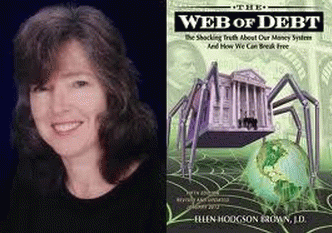I interviewed Ellen Brown on April 30th. This is part one of a two part interview.
Here's a link to the audio podcast.
Thanks to Don Caldarazzo for doing the transcript.
Also, check out the Public Banking Conference , June 2-4, here.
BIO:
Rob Kall: And welcome to the Rob Kall Bottom Up Radio
Show, WNJC 1360 AM out of Washington Township, reaching metro Philly and South
Jersey. My guest tonight is Ellen
Brown. Now, Ellen Brown could be THE world expert on public banking. When I
think of public banking, I think of Ellen Brown.
Ellen Brown: (laughs)
Rob Kall: She has
been writing on this for a long time.
She's got a book out: The Web of Debt: The Shocking Truth About Our
Money System, and How We Can Break Free.
Welcome to the Show!
Ellen Brown: Thanks
Rob! Great to talk to you.
Rob Kall: Really
good to have you here, back again. Now,
a couple things. I want to get some
definitions set up, because you talk about ideas and concepts that are really
important, that touch everybody's lives, but I don't know that everybody really
understands some of the ideas. So let's
start off with derivatives and the Glass-Steagall Act. Could you describe what each of those are?
Ellen Brown: OK.
Well, the Glass-Steagall Act was passed in 1934 and it separated
investment banking from depository banking.
Before that, the banks we commingling their funds; so if they did some
wild investments that went bad, they took those from the depositors'
funds. For many years after Glass-Steagall
was imposed, things went along fine.
Then they repealed Glass-Steagall in 1999 - supposedly to help the
banks, to help them with their market share - because (laughs) they were losing
market share. For this reason, they
changed the law.
Next Page 1 | 2 | 3 | 4 | 5 | 6 | 7 | 8
(Note: You can view every article as one long page if you sign up as an Advocate Member, or higher).






